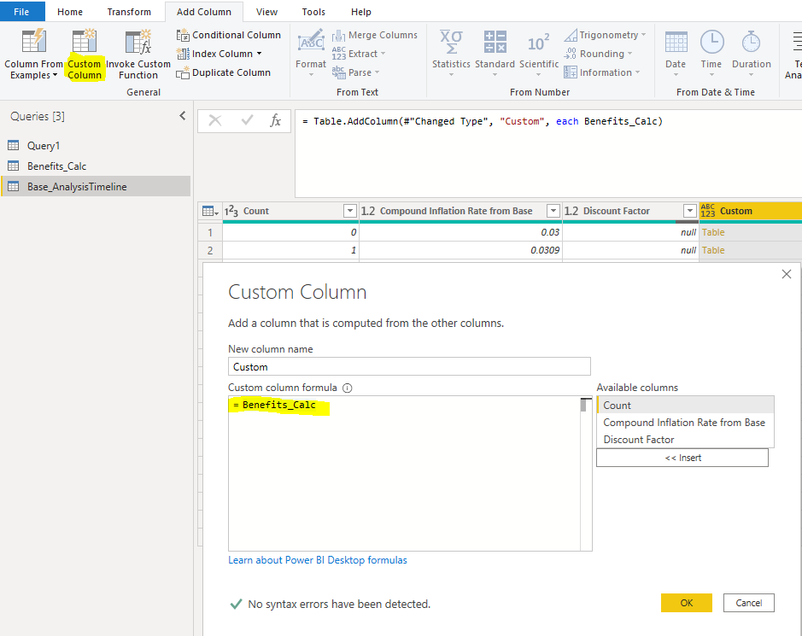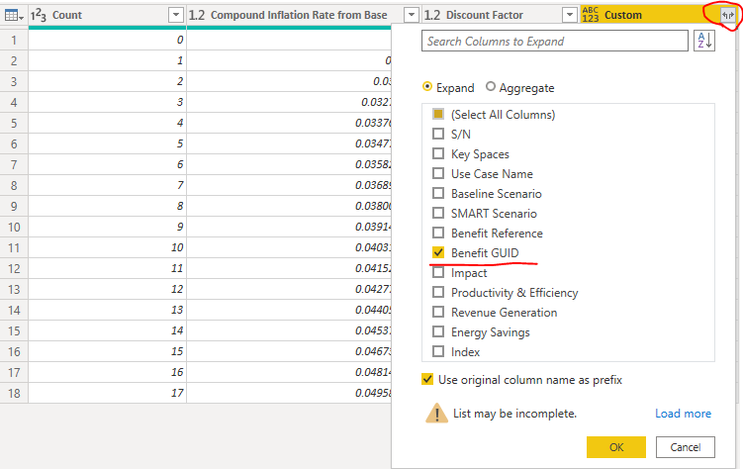FabCon is coming to Atlanta
Join us at FabCon Atlanta from March 16 - 20, 2026, for the ultimate Fabric, Power BI, AI and SQL community-led event. Save $200 with code FABCOMM.
Register now!- Power BI forums
- Get Help with Power BI
- Desktop
- Service
- Report Server
- Power Query
- Mobile Apps
- Developer
- DAX Commands and Tips
- Custom Visuals Development Discussion
- Health and Life Sciences
- Power BI Spanish forums
- Translated Spanish Desktop
- Training and Consulting
- Instructor Led Training
- Dashboard in a Day for Women, by Women
- Galleries
- Data Stories Gallery
- Themes Gallery
- Contests Gallery
- QuickViz Gallery
- Quick Measures Gallery
- Visual Calculations Gallery
- Notebook Gallery
- Translytical Task Flow Gallery
- TMDL Gallery
- R Script Showcase
- Webinars and Video Gallery
- Ideas
- Custom Visuals Ideas (read-only)
- Issues
- Issues
- Events
- Upcoming Events
The Power BI Data Visualization World Championships is back! Get ahead of the game and start preparing now! Learn more
- Power BI forums
- Forums
- Get Help with Power BI
- Power Query
- Extracting Values From a List & Inserting in Table...
- Subscribe to RSS Feed
- Mark Topic as New
- Mark Topic as Read
- Float this Topic for Current User
- Bookmark
- Subscribe
- Printer Friendly Page
- Mark as New
- Bookmark
- Subscribe
- Mute
- Subscribe to RSS Feed
- Permalink
- Report Inappropriate Content
Extracting Values From a List & Inserting in Table at Specific Rows
Hi,
Link to File: Excel File
I am trying to create a combined table from 2 source tables (Base_AnalysisTimeline and Benefits_Calc). I want to take the list of dates from the Base_AnalysisTimeline and have them repeat for every unique Benefit GUID from Benefits_Calc. I've got this part working. What I am struggling with is now inserting the Benefit GUID at each point where the row repeat begins, ie:
Benefit GUID | Count | Compound... | Discount Factor... |
U1B1 | 0 |
|
|
| 1 |
|
|
| 2 |
|
|
| 3 |
|
|
| ETC |
|
|
U1B2 | 0 |
|
|
| 1 |
|
|
| 2 |
|
|
| 3 |
|
|
| ETC |
|
|
U1B3 | 0 |
|
|
| 1 |
|
|
| ETC |
|
|
I had created the testFunction1 to generate the list of distinct GUIDs and then to loop through and update the value it pulls from the list based on the index. This would then provide the next GUID in the list when the Count = 0. There is something going wrong, and in the table when I invoke the function I get:
"Expression.Error: We cannot convert the value 4 to type Function.
Details:
Value=4
Type=[Type]"
This is my first time doing any M coding and working with power query, so any possible help would be greatly appreciated.
Thanks in advance!
Solved! Go to Solution.
- Mark as New
- Bookmark
- Subscribe
- Mute
- Subscribe to RSS Feed
- Permalink
- Report Inappropriate Content
Hello @Andyb431
try this approach. Use your BenefitGUID-table and add a new column where you inserting you Timeline-table on every row. After that you expand the table
let
Base_AnalysisTimeline=
let
Source = Table.FromRows(Json.Document(Binary.Decompress(Binary.FromText("i45WMlSK1YlWMgKTxmDSBEyagkkzMGkOJi2UYmMB", BinaryEncoding.Base64), Compression.Deflate)), let _t = ((type nullable text) meta [Serialized.Text = true]) in type table [Count = _t]),
#"Changed Type" = Table.TransformColumnTypes(Source,{{"Count", Int64.Type}})
in
#"Changed Type",
BenefitGUID = #table({"Benefit GUID"}, {{"U1B1"}, {"U1B2"}, {"U1B3"}}),
Multiply = Table.AddColumn
(
BenefitGUID,
"BaseAnalysisTimeLine",
each Base_AnalysisTimeline
),
Expand = Table.ExpandTableColumn(Multiply, "BaseAnalysisTimeLine", {"Count"}, {"Count"})
in
Expand
Copy paste this code to the advanced editor in a new blank query to see how the solution works.
If this post helps or solves your problem, please mark it as solution (to help other users find useful content and to acknowledge the work of users that helped you)
Kudoes are nice too
Have fun
Jimmy
- Mark as New
- Bookmark
- Subscribe
- Mute
- Subscribe to RSS Feed
- Permalink
- Report Inappropriate Content
Hello @Andyb431
try this approach. Use your BenefitGUID-table and add a new column where you inserting you Timeline-table on every row. After that you expand the table
let
Base_AnalysisTimeline=
let
Source = Table.FromRows(Json.Document(Binary.Decompress(Binary.FromText("i45WMlSK1YlWMgKTxmDSBEyagkkzMGkOJi2UYmMB", BinaryEncoding.Base64), Compression.Deflate)), let _t = ((type nullable text) meta [Serialized.Text = true]) in type table [Count = _t]),
#"Changed Type" = Table.TransformColumnTypes(Source,{{"Count", Int64.Type}})
in
#"Changed Type",
BenefitGUID = #table({"Benefit GUID"}, {{"U1B1"}, {"U1B2"}, {"U1B3"}}),
Multiply = Table.AddColumn
(
BenefitGUID,
"BaseAnalysisTimeLine",
each Base_AnalysisTimeline
),
Expand = Table.ExpandTableColumn(Multiply, "BaseAnalysisTimeLine", {"Count"}, {"Count"})
in
Expand
Copy paste this code to the advanced editor in a new blank query to see how the solution works.
If this post helps or solves your problem, please mark it as solution (to help other users find useful content and to acknowledge the work of users that helped you)
Kudoes are nice too
Have fun
Jimmy
- Mark as New
- Bookmark
- Subscribe
- Mute
- Subscribe to RSS Feed
- Permalink
- Report Inappropriate Content
Hi @Jimmy801 ,
Here is what I ended up with (note that I added a couple of columns on the right for additional values too):
let
//Setup Base Table with GUIDs and Count
Table_Setup1 =
let
//Get the source table and update the types
Base_AnalysisTimeline =
let
Source = Excel.CurrentWorkbook(){[Name="Base_AnalysisTimeline"]}[content],
#"Changed Type" = Table.TransformColumnTypes(Base_AnalysisTimeline,{{"Count", Int64.Type}})
in
#"Changed Type",
//Create a table of the GUIDs
BenefitGUID = Table.FromList(
List.Distinct(Benefits_Calc[Benefit GUID])
),
//Add a column containing a table of the count for every BenefitGUID
Multiply = Table.AddColumn
(
BenefitGUID,
"BaseAnalysisTimeLine",
each Base_AnalysisTimeline
),
//Expand the Tables in the New Column
expandedTable = Table.ExpandTableColumn(Multiply, "BaseAnalysisTimeLine", {"Count"}, {"Count"}),
//Rename GUID Column
#"Renamed Columns" = Table.RenameColumns(expandedTable,{{"Column1", "Benefit GUID"}})
in
#"Renamed Columns",
//Add Inflation Column to Table_Setup1
Table_Setup2 =
let
//Get number of unique Benefit GUIDs
noUniqueGUID = List.Count(List.Distinct(Benefits_Calc[Benefit GUID])),
//Create temporary list of Inflation Rates
tempList = Base_AnalysisTimeline[Compound Inflation Rate from Base],
//Repeat the rows the same as unique GUIDs
repeatList = List.Repeat(tempList, noUniqueGUID),
tempTable = Table.FromColumns({repeatList}),
//add index to that table:
tempTableWithIndex = Table.AddIndexColumn(tempTable, "joinIndex", 0, 1),
//add index to passed in table:
targetTableWithIndex = Table.AddIndexColumn(Table_Setup1, "joinIndex", 0, 1),
joinedTable = Table.Join(targetTableWithIndex , "joinIndex", tempTableWithIndex , "joinIndex", JoinSide.Left),
//remove the index column from joined table we dont need it
joinedTableWithoutIndex = Table.RemoveColumns(joinedTable, "joinIndex"),
#"Renamed Columns" = Table.RenameColumns(joinedTableWithoutIndex,{{"Column1", "Compound Inflation Rate from Base"}})
in
#"Renamed Columns",
//Add Discount Factor Column to Table_Setup2
Table_Setup3 =
let
//Get number of unique Benefit GUIDs
noUniqueGUID = List.Count(List.Distinct(Benefits_Calc[Benefit GUID])),
//Create temporary list of Inflation Rates
tempList = Base_AnalysisTimeline[Discount Factor],
//Repeat the rows the same as unique GUIDs
repeatList = List.Repeat(tempList, noUniqueGUID),
tempTable = Table.FromColumns({repeatList}),
//add index to that table:
tempTableWithIndex = Table.AddIndexColumn(tempTable, "joinIndex", 0, 1),
//add index to passed in table:
targetTableWithIndex = Table.AddIndexColumn(Table_Setup2, "joinIndex", 0, 1),
joinedTable = Table.Join(targetTableWithIndex , "joinIndex", tempTableWithIndex , "joinIndex", JoinSide.Left),
//remove the index column from joined table we dont need it
joinedTableWithoutIndex = Table.RemoveColumns(joinedTable, "joinIndex"),
#"Renamed Columns" = Table.RenameColumns(joinedTableWithoutIndex,{{"Column1", "Discount Factor"}})
in
#"Renamed Columns"
in
Table_Setup3
Not the most elegant solution I'm sure, but I'm happy with it for my first attempt.
Thanks again for all the help!
- Mark as New
- Bookmark
- Subscribe
- Mute
- Subscribe to RSS Feed
- Permalink
- Report Inappropriate Content
Hi Jimmy,
First, thanks very much for helping! Super useful!
I have a couple of questions where I don't quite understand how the code is working due to my limited knowledge:
1) For the Base_AnalysisTimeline table, why did you use the Table/JSON, etc. method to create the table rather than the usual "Source = Currentworkbook() etc."? Is there an advantage of doing it this way?
2) For "BenefitGUID = #table({"Benefit GUID"}, {{"U1B1"}, {"U1B2"}, {"U1B3"}})", I guess I could replace this with a query which calls List.Distinct from my existing Benefits_Calc table and remove the other columns to create a table from that? The number of GUIDs will vary over time, so I will need the table to update row numbers dynamically.
Thanks again!
- Mark as New
- Bookmark
- Subscribe
- Mute
- Subscribe to RSS Feed
- Permalink
- Report Inappropriate Content
Hi @Andyb431 ,
@Jimmy801 is right. You could just add the column "Benefit GUID" into another table and then expend it. I have created a simple sample using your file. Please have a try.
Xue Ding
If this post helps, then please consider Accept it as the solution to help the other members find it more quickly.
- Mark as New
- Bookmark
- Subscribe
- Mute
- Subscribe to RSS Feed
- Permalink
- Report Inappropriate Content
Hello @Andyb431
this is only to be able to present here a solution, that everybody can analyse and understand. For sure you have to substitue this part with your data source ... if its currentworkbook, replace it with that
All the best
Jimmy
Helpful resources

Power BI Dataviz World Championships
The Power BI Data Visualization World Championships is back! Get ahead of the game and start preparing now!




